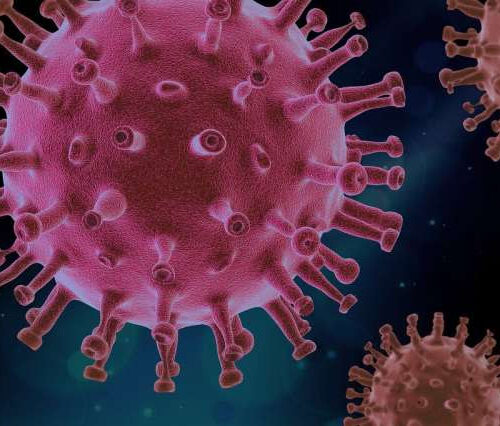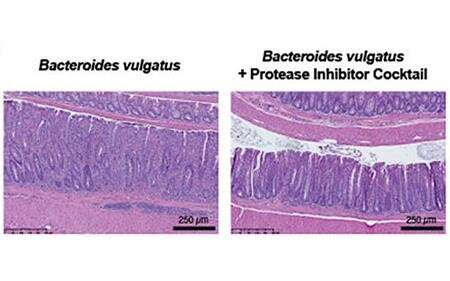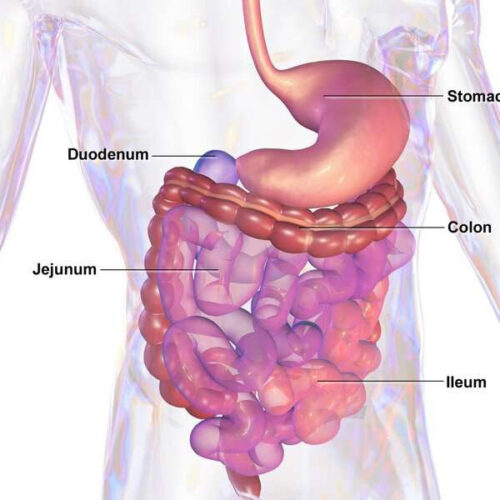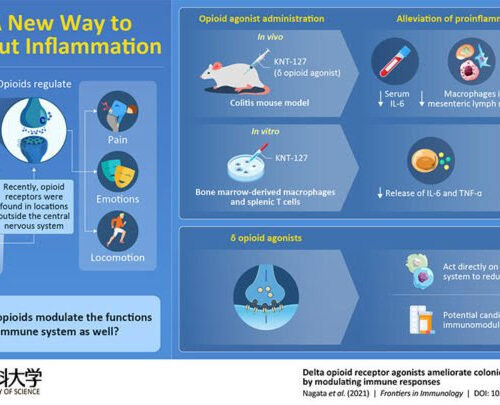by Cedars-Sinai Medical Center Credit: Pixabay/CC0 Public Domain Getting the COVID-19 vaccination strengthened one type of immune response to the SARS-CoV-2 virus in inflammatory bowel disease (IBD) patients even though they were taking immunosuppressant medication, according to investigators at Cedars-Sinai. The findings of two studies focused on this topic have been published in the journals IBD, of...
Tag: <span>Bowel disease</span>
Stool samples reveal microbial enzyme driving bowel disease
by Nicole Mlynaryk, University of California – San Diego The presence of Bacteroides vulgatus led to colitis in the mouse colon (left). However, protease inhibition protected the walls of the colon and reduced influx of inflammatory cells (right). Credit: University of California – San Diego Ulcerative colitis, a subtype of inflammatory bowel disease, is a...
Inflammatory bowel disease: Incidence and treatment
by Karolinska Institutet Gastrointestinal System. Credit: Blausen.com staff (2014). “Medical gallery of Blausen Medical 2014”. WikiJournal of Medicine 1 (2). DOI:10.15347/wjm/2014.010. ISSN 2002-4436. CC BY 3.0 Inflammatory bowel disease (IBD), with its two main disease entities Crohn’s disease and ulcerative colitis, is a chronic and relapsing inflammation of the gastrointestinal tract. The highest prevalence of...
Investigating the relationship between inflammatory bowel disease and C. diff
The gut-infecting bacterium, Clostridioides difficile, commonly known as C. diff, sickens half a million people and causes up to 30,000 deaths in the United States each year. Often, C. difficile infection occurs after antibiotic treatment, which inadvertently kills members of the gut microbiota—the community of microbes living in our intestines—that normally bar C. difficile from invading the gut. However,...
A more targeted therapy to treat inflammatory bowel disease
by University of California – Riverside Dr. David Lo is a distinguished professor of biomedical sciences at UC Riverside. Credit: I. Pittalwala, UC Riverside. Biomedical scientists at the University of California, Riverside, propose a way for drugs to be more effective against inflammatory bowel disease, or IBD, in which the intestine undergoes inflammation. IBD, a...
New Treatment for Inflammatory Bowel Disease: Opioids May Cure that “Bad Gut Feeling”
Opioid receptors play key roles in regulating our senses and emotions. Recently, their discovery outside the nervous system raised several questions about the effects of opioids on the immune system. Now, researchers from Japan have shown that KNT-127—a drug that targets delta opioid receptors—can reduce pro-inflammatory signals in the colon. Their research highlights the immunomodulatory...
Potential preventative treatment demonstrated for Crohn’s disease
UNIVERSITY OF ALABAMA AT BIRMINGHAM BIRMINGHAM, Ala. – A potential preventive treatment for Crohn’s disease, a form of inflammatory bowel disease, has been demonstrated in a mouse model and using immune-reactive T cells from patients with Crohn’s disease. This research, led by University of Alabama at Birmingham researcher Charles O. Elson, M.D., professor of medicine, focused...
Certain foods common in diets of US adults with inflammatory bowel disease
by Georgia State University Foods, such as French fries, cheese, cookies, soda, and sports and energy drinks, are commonly found in the diets of United States adults with inflammatory bowel disease, according to a new study by researchers in the Institute for Biomedical Sciences at Georgia State University. The researchers analyzed the National Health Interview...
Inhibiting a protease could improve the treatment of inflammatory bowel disease
The study, published in EMBO Molecular Medicine, shows that blockade of the protease MT1-MMP protects the vasculature in the inflamed gut CENTRO NACIONAL DE INVESTIGACIONES CARDIOVASCULARES CARLOS III (F.S.P.) Scientists at the Centro Nacional de Investigaciones Cardiovasculares (CNIC) and the Centro de Investigaciones Biológicas (CIB) of the Consejo Superior de Investigaciones Científicas (CSIC) have identified...
Testing people with bowel cancer for genetic syndrome could save lives and money
by Medical Journal of Australia Lynch syndrome, a mutation of four genes involved in DNA repair, is associated with increased risk of developing a range of cancers, particularly colorectal cancer (CRC). In the most comprehensive analysis for Australia to date, published online by the Medical Journal of Australia today, an international team of researchers led...






